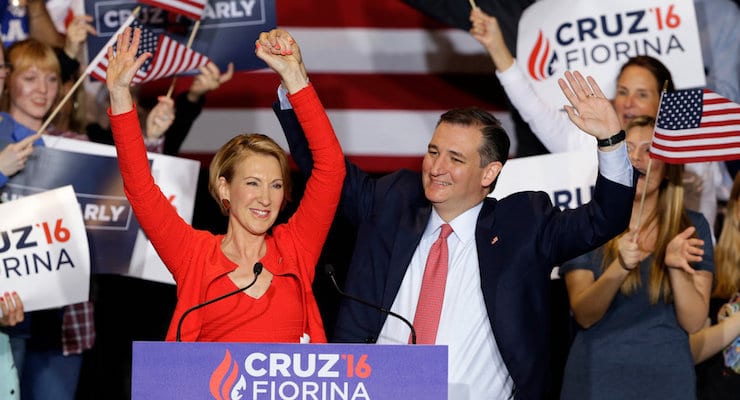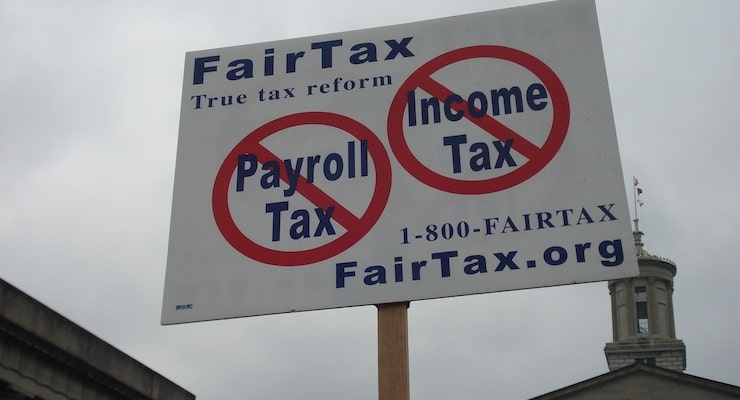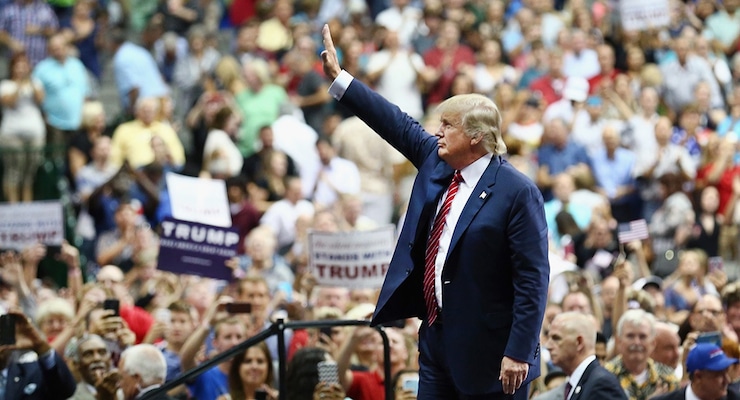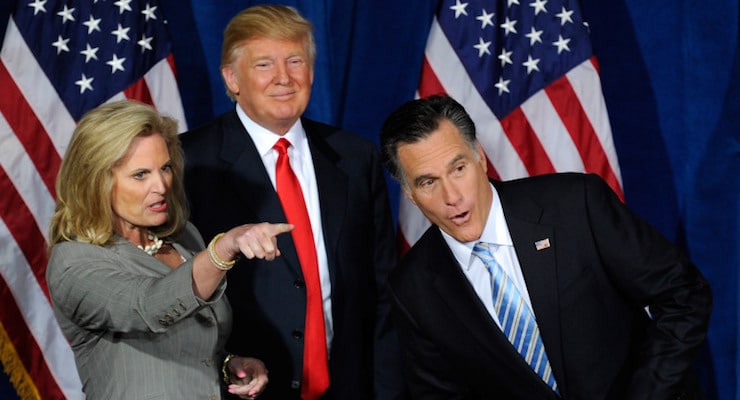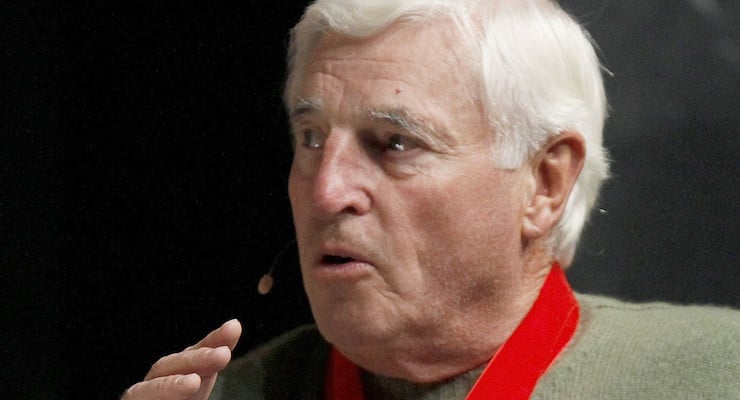
Republican presidential candidate Donald Trump gives a foreign policy speech at the Mayflower Hotel in Washington, Wednesday, April 27, 2016. (Photo: AP Photo/Evan Vucci)
Full Transcript: Donald Trump outlined his America First foreign policy platform in a major address at the Mayflower Hotel on Wednesday in Washington, D.C.
FULL TRANSCRIPT BELOW
Thank you for the opportunity to speak to you, and thank you to the Center for the National Interest for honoring me with this invitation.
I would like to talk today about how to develop a new foreign policy direction for our country – one that replaces randomness with purpose, ideology with strategy, and chaos with peace.
It is time to shake the rust off of America’s foreign policy. It’s time to invite new voices and new visions into the fold.
The direction I will outline today will also return us to a timeless principle. My foreign policy will always put the interests of the American people, and American security, above all else. That will be the foundation of every decision that I will make.
America First will be the major and overriding theme of my administration.
But to chart our path forward, we must first briefly look back.
We have a lot to be proud of. In the 1940s we saved the world. The Greatest Generation beat back the Nazis and the Japanese Imperialists.
Then we saved the world again, this time from totalitarian Communism. The Cold War lasted for decades, but we won.
Democrats and Republicans working together got Mr. Gorbachev to heed the words of President Reagan when he said: “tear down this wall.”
History will not forget what we did.
Unfortunately, after the Cold War, our foreign policy veered badly off course. We failed to develop a new vision for a new time. In fact, as time went on, our foreign policy began to make less and less sense.
Logic was replaced with foolishness and arrogance, and this led to one foreign policy disaster after another.
We went from mistakes in Iraq to Egypt to Libya, to President Obama’s line in the sand in Syria. Each of these actions have helped to throw the region into chaos, and gave ISIS the space it needs to grow and prosper.
It all began with the dangerous idea that we could make Western democracies out of countries that had no experience or interest in becoming a Western Democracy.
We tore up what institutions they had and then were surprised at what we unleashed. Civil war, religious fanaticism; thousands of American lives, and many trillions of dollars, were lost as a result. The vacuum was created that ISIS would fill. Iran, too, would rush in and fill the void, much to their unjust enrichment.
Our foreign policy is a complete and total disaster.
No vision, no purpose, no direction, no strategy.
Today, I want to identify five main weaknesses in our foreign policy.
First, Our Resources Are Overextended
President Obama has weakened our military by weakening our economy. He’s crippled us with wasteful spending, massive debt, low growth, a huge trade deficit and open borders.
Our manufacturing trade deficit with the world is now approaching $1 trillion a year. We’re rebuilding other countries while weakening our own.
Ending the theft of American jobs will give us the resources we need to rebuild our military and regain our financial independence and strength.
I am the only person running for the Presidency who understands this problem and knows how to fix it.
Secondly, our allies are not paying their fair share.
Our allies must contribute toward the financial, political and human costs of our tremendous security burden. But many of them are simply not doing so. They look at the United States as weak and forgiving and feel no obligation to honor their agreements with us.
In NATO, for instance, only 4 of 28 other member countries, besides America, are spending the minimum required 2% of GDP on defense.
We have spent trillions of dollars over time – on planes, missiles, ships, equipment – building up our military to provide a strong defense for Europe and Asia. The countries we are defending must pay for the cost of this defense – and, if not, the U.S. must be prepared to let these countries defend themselves.
The whole world will be safer if our allies do their part to support our common defense and security.
A Trump Administration will lead a free world that is properly armed and funded.
Thirdly, our friends are beginning to think they can’t depend on us.
We’ve had a president who dislikes our friends and bows to our enemies.
He negotiated a disastrous deal with Iran, and then we watched them ignore its terms, even before the ink was dry.
Iran cannot be allowed to have a nuclear weapon and, under a Trump Administration, will never be allowed to have a nuclear weapon.
All of this without even mentioning the humiliation of the United States with Iran’s treatment of our ten captured sailors.
In negotiation, you must be willing to walk. The Iran deal, like so many of our worst agreements, is the result of not being willing to leave the table. When the other side knows you’re not going to walk, it becomes absolutely impossible to win.
At the same time, your friends need to know that you will stick by the agreements that you have with them.
President Obama gutted our missile defense program, then abandoned our missile defense plans with Poland and the Czech Republic.
He supported the ouster of a friendly regime in Egypt that had a longstanding peace treaty with Israel – and then helped bring the Muslim Brotherhood to power in its place.
Israel, our great friend and the one true Democracy in the Middle East, has been snubbed and criticized by an Administration that lacks moral clarity. Just a few days ago, Vice President Biden again criticized Israel – a force for justice and peace – for acting as an impediment to peace in the region.
President Obama has not been a friend to Israel. He has treated Iran with tender love and care and made it a great power in the Middle East – all at the expense of Israel, our other allies in the region and, critically, the United States.
We’ve picked fights with our oldest friends, and now they’re starting to look elsewhere for help.
Fourth, our rivals no longer respect us.
In fact, they are just as confused as our allies, but an even bigger problem is that they don’t take us seriously any more.
When President Obama landed in Cuba on Air Force One, no leader was there to meet or greet him – perhaps an incident without precedent in the long and prestigious history of Air Force One.
Then, amazingly, the same thing happened in Saudi Arabia — it’s called no respect.
Do you remember when the President made a long and expensive trip to Copenhagen, Denmark to get the Olympics for our country, and, after this unprecedented effort, it was announced that the United States came in fourth place?
He should have known the result before making such an embarrassing commitment.
The list of humiliations goes on and on.
President Obama watches helplessly as North Korea increases its aggression and expands even further with its nuclear reach.
Our president has allowed China to continue its economic assault on American jobs and wealth, refusing to enforce trade rules – or apply the leverage on China necessary to rein in North Korea.
He has even allowed China to steal government secrets with cyber attacks and engage in industrial espionage against the United States and its companies.
We’ve let our rivals and challengers think they can get away with anything.
If President Obama’s goal had been to weaken America, he could not have done a better job.
Finally, America no longer has a clear understanding of our foreign policy goals.
Since the end of the Cold War and the break-up of the Soviet Union, we’ve lacked a coherent foreign policy.
One day we’re bombing Libya and getting rid of a dictator to foster democracy for civilians, the next day we are watching the same civilians suffer while that country falls apart.
We’re a humanitarian nation. But the legacy of the Obama-Clinton interventions will be weakness, confusion, and disarray.
We have made the Middle East more unstable and chaotic than ever before.
We left Christians subject to intense persecution and even genocide.
Our actions in Iraq, Libya and Syria have helped unleash ISIS.
And we’re in a war against radical Islam, but President Obama won’t even name the enemy!
Hillary Clinton also refuses to say the words “radical Islam,” even as she pushes for a massive increase in refugees.
After Secretary Clinton’s failed intervention in Libya, Islamic terrorists in Benghazi took down our consulate and killed our ambassador and three brave Americans. Then, instead of taking charge that night, Hillary Clinton decided to go home and sleep! Incredible.
Clinton blames it all on a video, an excuse that was a total lie. Our Ambassador was murdered and our Secretary of State misled the nation – and by the way, she was not awake to take that call at 3 o’clock in the morning.
And now ISIS is making millions of dollars a week selling Libyan oil.
This will change when I am president.
To all our friends and allies, I say America is going to be strong again. America is going to be a reliable friend and ally again.
We’re going to finally have a coherent foreign policy based upon American interests, and the shared interests of our allies.
We are getting out of the nation-building business, and instead focusing on creating stability in the world.
Our moments of greatest strength came when politics ended at the water’s edge.
We need a new, rational American foreign policy, informed by the best minds and supported by both parties, as well as by our close allies.
This is how we won the Cold War, and it’s how we will win our new and future struggles.
First, we need a long-term plan to halt the spread and reach of radical Islam.
Containing the spread of radical Islam must be a major foreign policy goal of the United States.
Events may require the use of military force. But it’s also a philosophical struggle, like our long struggle in the Cold War.
In this we’re going to be working very closely with our allies in the Muslim world, all of which are at risk from radical Islamic violence.
We should work together with any nation in the region that is threatened by the rise of radical Islam. But this has to be a two-way street – they must also be good to us and remember us and all we are doing for them.
The struggle against radical Islam also takes place in our homeland. There are scores of recent migrants inside our borders charged with terrorism. For every case known to the public, there are dozens more.
We must stop importing extremism through senseless immigration policies.
A pause for reassessment will help us to prevent the next San Bernardino or worse — all you have to do is look at the World Trade Center and September 11th.
And then there’s ISIS. I have a simple message for them. Their days are numbered. I won’t tell them where and I won’t tell them how. We must as, a nation, be more unpredictable. But they’re going to be gone. And soon.
Secondly, we have to rebuild our military and our economy.
The Russians and Chinese have rapidly expanded their military capability, but look what’s happened to us!
Our nuclear weapons arsenal – our ultimate deterrent – has been allowed to atrophy and is desperately in need of modernization and renewal.
Our active duty armed forces have shrunk from 2 million in 1991 to about 1.3 million today.
The Navy has shrunk from over 500 ships to 272 ships during that time.
The Air Force is about 1/3 smaller than 1991. Pilots are flying B-52s in combat missions today which are older than most people in this room.
And what are we doing about this? President Obama has proposed a 2017 defense budget that, in real dollars, cuts nearly 25% from what we were spending in 2011.
Our military is depleted, and we’re asking our generals and military leaders to worry about global warming.
We will spend what we need to rebuild our military. It is the cheapest investment we can make. We will develop, build and purchase the best equipment known to mankind. Our military dominance must be unquestioned.
But we will look for savings and spend our money wisely. In this time of mounting debt, not one dollar can be wasted.
We are also going to have to change our trade, immigration and economic policies to make our economy strong again – and to put Americans first again. This will ensure that our own workers, right here in America, get the jobs and higher pay that will grow our tax revenue and increase our economic might as a nation.
We need to think smarter about areas where our technological superiority gives us an edge. This includes 3-D printing, artificial intelligence and cyberwarfare.
A great country also takes care of its warriors. Our commitment to them is absolute. A Trump Administration will give our service men and women the best equipment and support in the world when they serve, and the best care in the world when they return as veterans to civilian life.
Finally, we must develop a foreign policy based on American interests.
Businesses do not succeed when they lose sight of their core interests and neither do countries.
Look at what happened in the 1990s. Our embassies in Kenya and Tanzania were attacked and seventeen brave sailors were killed on the USS Cole. And what did we do? It seemed we put more effort into adding China to the World Trade Organization – which has been a disaster for the United States – than into stopping Al Qaeda.
We even had an opportunity to take out Osama Bin Laden, and didn’t do it. And then, we got hit at the World Trade Center and the Pentagon, the worst attack on our country in its history.
Our foreign policy goals must be based on America’s core national security interests, and the following will be my priorities.
In the Middle East, our goals must be to defeat terrorists and promote regional stability, not radical change. We need to be clear-sighted about the groups that will never be anything other than enemies.
And we must only be generous to those that prove they are our friends.
We desire to live peacefully and in friendship with Russia and China. We have serious differences with these two nations, and must regard them with open eyes. But we are not bound to be adversaries. We should seek common ground based on shared interests. Russia, for instance, has also seen the horror of Islamic terrorism.
I believe an easing of tensions and improved relations with Russia – from a position of strength – is possible. Common sense says this cycle of hostility must end. Some say the Russians won’t be reasonable. I intend to find out. If we can’t make a good deal for America, then we will quickly walk from the table.
Fixing our relations with China is another important step towards a prosperous century. China respects strength, and by letting them take advantage of us economically, we have lost all of their respect. We have a massive trade deficit with China, a deficit we must find a way, quickly, to balance.
A strong and smart America is an America that will find a better friend in China. We can both benefit or we can both go our separate ways.
After I am elected President, I will also call for a summit with our NATO allies, and a separate summit with our Asian allies. In these summits, we will not only discuss a rebalancing of financial commitments, but take a fresh look at how we can adopt new strategies for tackling our common challenges.
For instance, we will discuss how we can upgrade NATO’s outdated mission and structure – grown out of the Cold War – to confront our shared challenges, including migration and Islamic terrorism.
I will not hesitate to deploy military force when there is no alternative. But if America fights, it must fight to win. I will never send our finest into battle unless necessary – and will only do so if we have a plan for victory.
Our goal is peace and prosperity, not war and destruction.
The best way to achieve those goals is through a disciplined, deliberate and consistent foreign policy.
With President Obama and Secretary Clinton we’ve had the exact opposite: a reckless, rudderless and aimless foreign policy – one that has blazed a path of destruction in its wake.
After losing thousands of lives and spending trillions of dollars, we are in far worse shape now in the Middle East than ever before.
I challenge anyone to explain the strategic foreign policy vision of Obama-Clinton – it has been a complete and total disaster.
I will also be prepared to deploy America’s economic resources. Financial leverage and sanctions can be very persuasive – but we need to use them selectively and with determination. Our power will be used if others do not play by the rules.
Our friends and enemies must know that if I draw a line in the sand, I will enforce it.
However, unlike other candidates for the presidency, war and aggression will not be my first instinct. You cannot have a foreign policy without diplomacy. A superpower understands that caution and restraint are signs of strength.
Although not in government service, I was totally against the War in Iraq, saying for many years that it would destabilize the Middle East. Sadly, I was correct, and the biggest beneficiary was Iran, who is systematically taking over Iraq and gaining access to their rich oil reserves – something it has wanted to do for decades. And now, to top it all off, we have ISIS.
My goal is to establish a foreign policy that will endure for several generations.
That is why I will also look for talented experts with new approaches, and practical ideas, rather than surrounding myself with those who have perfect resumes but very little to brag about except responsibility for a long history of failed policies and continued losses at war.
Finally, I will work with our allies to reinvigorate Western values and institutions. Instead of trying to spread “universal values” that not everyone shares, we should understand that strengthening and promoting Western civilization and its accomplishments will do more to inspire positive reforms around the world than military interventions.
These are my goals, as president.
I will seek a foreign policy that all Americans, whatever their party, can support, and which our friends and allies will respect and welcome.
The world must know that we do not go abroad in search of enemies, that we are always happy when old enemies become friends, and when old friends become allies.
To achieve these goals, Americans must have confidence in their country and its leadership again.
Many Americans must wonder why our politicians seem more interested in defending the borders of foreign countries than their own.
Americans must know that we are putting the American people first again. On trade, on immigration, on foreign policy – the jobs, incomes and security of the American worker will always be my first priority.
No country has ever prospered that failed to put its own interests first. Both our friends and enemies put their countries above ours and we, while being fair to them, must do the same.
We will no longer surrender this country, or its people, to the false song of globalism.
The nation-state remains the true foundation for happiness and harmony. I am skeptical of international unions that tie us up and bring America down, and will never enter America into any agreement that reduces our ability to control our own affairs.
NAFTA, as an example, has been a total disaster for the U.S. and has emptied our states of our manufacturing and our jobs. Never again. Only the reverse will happen. We will keep our jobs and bring in new ones. Their will be consequences for companies that leave the U.S. only to exploit it later.
Under a Trump Administration, no American citizen will ever again feel that their needs come second to the citizens of foreign countries.
I will view the world through the clear lens of American interests.
I will be America’s greatest defender and most loyal champion. We will not apologize for becoming successful again, but will instead embrace the unique heritage that makes us who we are.
The world is most peaceful, and most prosperous, when America is strongest.
America will continually play the role of peacemaker.
We will always help to save lives and, indeed, humanity itself. But to play that role, we must make America strong again.
We must make America respected again. And we must make America great again.
If we do that, perhaps this century can be the most peaceful and prosperous the world has ever known. Thank you.


